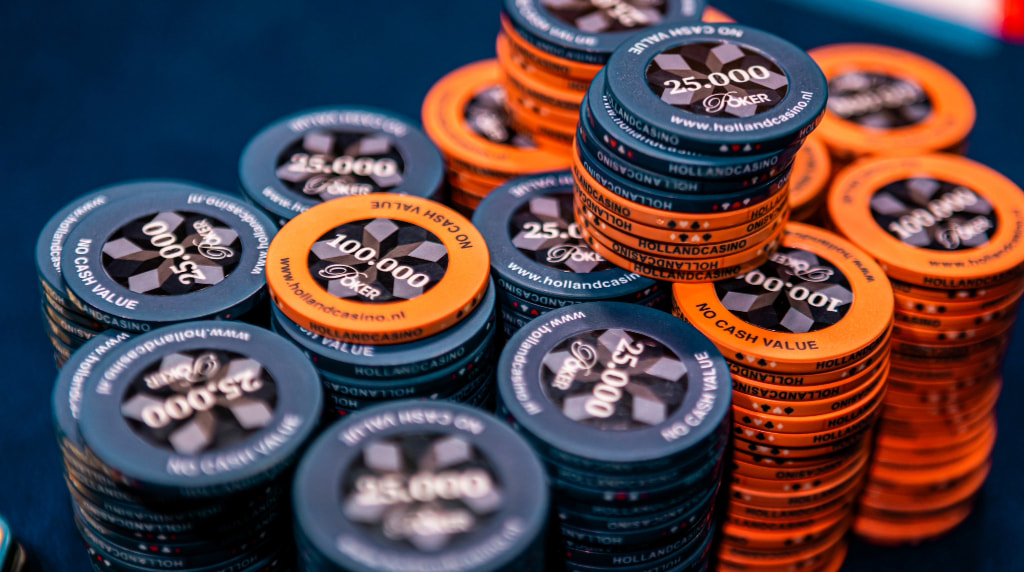How Casinos Make Money on Poker – The Rake
Casinos are in business to make money. Their business model is simple: offer games where the odds of reward are less than the probability of the outcome, and the surplus is profit. However, one casino game is different, and so, for profit-making purposes, it requires a different approach.

In poker, tournament chips have no cash value so ‘the rake’ comes from registration fees. © WPT on Flickr
Poker is not played against the house. Instead, players face off against one another in a game simply facilitated by casinos. With poker tables and player seating taking up considerable space, plus top-quality decks, chips, tables, and professional dealers costing plenty, the card game is a costly one to host.
So, how do casinos recoup their overheads and profit from offering tournament and cash game poker? Let us introduce you to ‘rake’ – a unique business model compared to traditional casino games that generates the money needed to keep land-based and online poker sites in business.
What Is Rake in Poker?
In poker, the term ‘rake’ has been derived from poker dealers drawing chips from the centre of the table in a raking motion. In the early days of poker, particularly in the United States, casinos would use an actual rake to take a small portion of the chips from the pot after each hand.
This practice was nowhere near as haphazard as it sounds, and while rakes are no longer used, the principle remains intact. ‘Raking a pot’ is the procedure of taking a small percentage or fixed amount from each cash pot before it is awarded to the winner of the hand.
Regardless of who wins individual hands or money from the game overall, poker rake is an integral part of how casinos and poker rooms of all kinds earn revenue from poker games. It is a simple fee.
It may be the most common, but taking a percentage of cash pots is not the only way casinos and online card rooms charge. In poker circles, ‘rake’ refers to any money poker operators have collected in fees for facilitating the game. There are several ways this can be taken.
Pot Rake
In percentage rake games, dealers are instructed – or the software pre-programmed in an online poker scenario – to deduct a percentage of the winning pot. It can range between 2.5% and 10%, albeit 5% is the industry norm, with a maximum cap on what can be taken from a pot.
For example, a typical structure is 5% of the pot up to a maximum of £5. This means if the pot is £100, the rake would be £5, but if the pot is only £20, the rake would be £1. At the 2024 World Series of Poker in Las Vegas, the tournament organiser’s rules imposed a house rake of 10% with a cap of $6.
No Flop, No Drop
In most live and online cardrooms, in Hold’em and Omaha games, no rake is taken if the hand does not reach the flop stage. This rule is known as ‘No Flop, No Drop’. It also applies to the period before fourth street in stud poker variants or before the draw in draw variants.
Time Collection (Timed Rake/Table Charge)
Instead of taking a percentage from each pot, some card rooms charge a set fee every half hour or hour played. It can be collected from each player at the table (known as ‘player time’) or from the first pot over a specific size (‘time pot’). This method is more common in high-stakes games or certain jurisdictions – such as California, where percentage rakes on cash games are forbidden by local law.
Fixed Fee (Dead Drop)
Here, a fixed amount is taken from each player per hand, albeit the player on the dealer button is often nominated to pay it before the cards are dealt. This method ensures that all players contribute to the rake regardless of whether they win or lose the hand.
Tournament Rake
For tournaments, rake is applied as a registration fee and added to the tournament entry. It can also be deducted from the cost of the tournament entry. A case in point is the 2024 Irish Open, where organisers charged its players €150 (registration fee) to play its €1,000 main event and then deducted 2.5% of the tournament entry for ‘staff gratuity’.
Ultimately, only €975 of the €1,150 entry players paid to participate in the Irish Open made its way into the prize pool. This is an extreme example. Other event organisers can be far more generous, and entry fees, often 10%, simply cover complimentary dinners, drinks, snacks and token costs.
Rent, Overheads and Expenses vs Skill Advantage
Ultimately, casinos, card rooms and even the best online poker sites employ various ways to generate income from games. Everyone, including infrequent recreational players, should consider their costs and overheads before playing any game.
Professionals will always factor in the cost of ‘renting their seat’ because playing several hours each week will incur substantial overheads. The sum can be calculated as a figure and factored against any possible advantage over rival players – and the ability to profit from them in the long term.
 5 Trends That Have Reshaped Online Casinos in the UK
5 Trends That Have Reshaped Online Casinos in the UK
 Celebrate the New Year at These UK Casinos
Celebrate the New Year at These UK Casinos
 5 Newcomer Online Casinos That Impressed Our Team in 2025
5 Newcomer Online Casinos That Impressed Our Team in 2025
 5 Unique Benefits We Wish More Casino Sites Offered
5 Unique Benefits We Wish More Casino Sites Offered